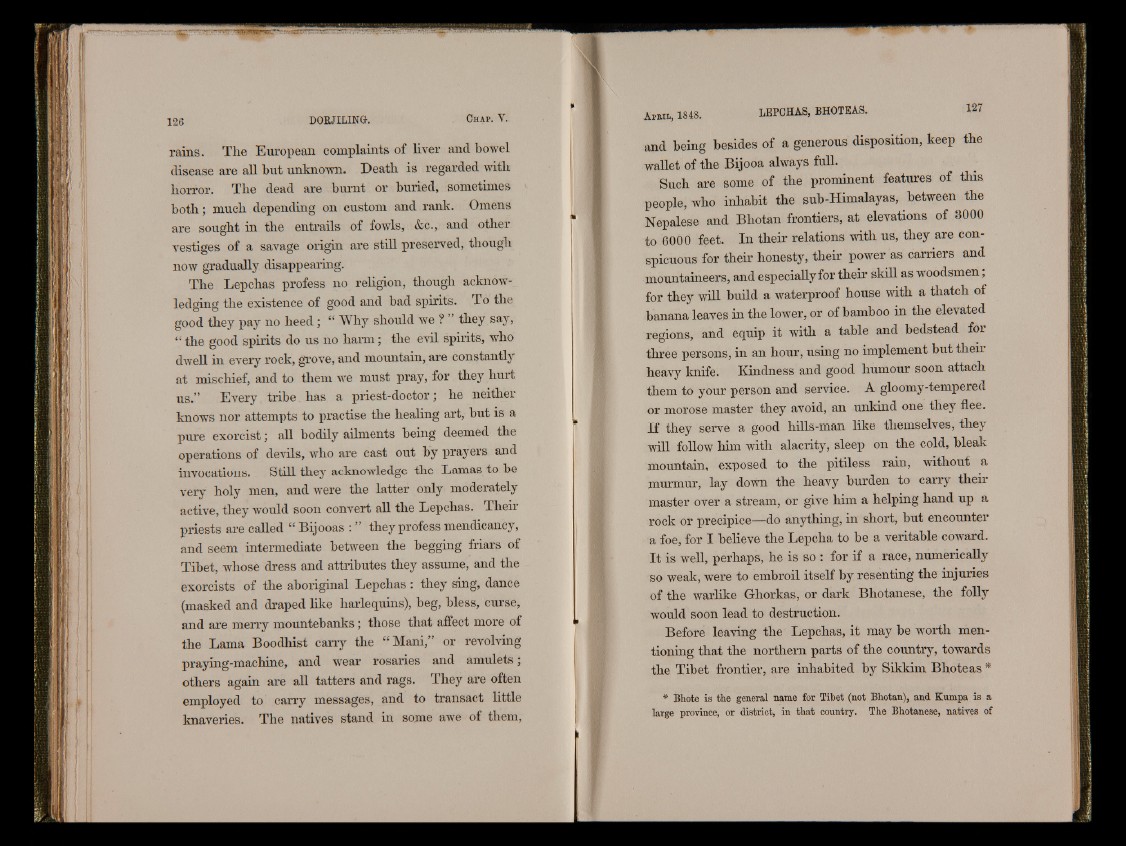
rains. The European complaints of liver and bowel
disease are all hut unknown. Death is regarded with
horror. The dead are burnt or buried, sometimes
b o th ; much depending on custom and rank. Omens
are sought in the entrails of fowls, &c., and other
vestiges of a savage origin are still preserved, though
now gradually disappearing.
The Lepchas profess no religion, though acknowledging
the existence of good and bad spirits. To the
good they pay no heed; “ Why should we ? they say,
“ the good spirits do us no harm; the evil spirits, who
dwell in every rock, grove, and mountain, are constantly
at mischief, and to them we must pray, for they hurt
us.” Every tribe has a priest-doctor; he neither
knows nor attempts to practise the healing art, but is a
pure exorcist; all bodily ailments being deemed the
operations of devils, who are cast out by prayers and
invocations. Still they acknowledge the Lamas to be
very holy men, and were the latter only moderately
active, they would soon convert all the Lepchas. Their
priests are called “ Bijooas : ” they profess mendicancy,
and seem intermediate between the begging friars of
Tibet, whose dress and attributes they assume, and the
exorcists of the aboriginal Lepchas : they sing, dance
(masked and draped like harlequins), beg, bless, curse,
and are merry mountebanks; those that affect more of
the Lama Boodhist carry the “ Mani,” or revolving
praying-machine, and wear rosaries and amulets;
others again are all tatters and rags. They are often
employed to carry messages, and to transact little
knaveries. The natives stand in some awe of them,
and being besides of a generous disposition, keep the
wallet of the Bijooa always full.
Such are some of the prominent features of this
people, who inhabit the sub-Himalayas, between the
Nepalese and Bhotan frontiers, at elevations of 3000
to 6000 feet. In their relations with us, they are conspicuous
for their honesty, their power as carriers and
mountaineers, and especially for their skill as woodsmen,
for they will build a waterproof house with a thatch of
banana leaves in the lower, or of bamboo in the elevated
regions, and equip it with a table and bedstead for
three persons, in an hour, using no implement but their
heavy knife. Kindness and good humour soon attach
them to your person and service. A gloomy-tempered
or morose master they avoid, an unkind one they flee.
If they serve a good hills-man like themselves, they
will follow him with alacrity, sleep on the cold, bleak
mountain, exposed to the pitiless rain, without a
murmur, lay down the heavy burden to carry their
master over a stream, or give him a helping hand up a
rock or precipice—do anything, in short, but encounter
a foe, for I believe the Lepcha to be a veritable coward.
I t is well, perhaps, he is so : for if a race, numerically
so weak, were to embroil itself by resenting the injuries
of the warlike Ghorkas, or dark Bhotanese, the folly
would soon lead to destruction.
Before leaving the Lepchas, it may be worth mentioning
that the northern parts of the country, towards
the Tibet frontier, are inhabited by Sikkim Bhoteas *
* Bhote is the general name for Tibet (not Bhotan), and Kumpa is a
large province, or district, in that country. The Bhotanese, natives of